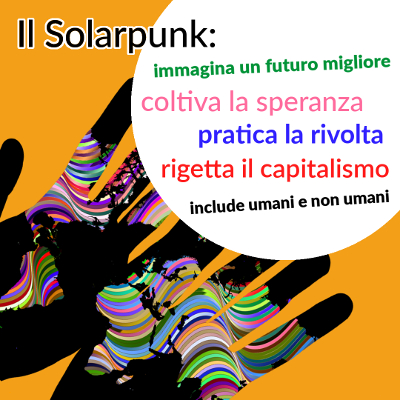Before we begin
Solarpunk is in progress, just like the world it tries to reconnect us to.
We acknowledge the inescapable change to come, and trust to the flow of History the permanence of these words of ours. Soon they will be outdated words, maybe they will all have to be rewritten. We accept this, and leave definitions not as dogmas, but as a testimony.
Part one – What is solarpunk
Solarpunk is a literary genre as it is an aesthetics. It is a movement as well: it envisions a better future and constructs operational strategies to attain it.
Born in the 2010s, solarpunk represents sentiments and appeals demanding collective, organic, fair, ecological, inclusive progress.
Right from its beginnings, it has expressed a complex and open, but clear, political vision: inclusive, feminist, ecologist, utopist, anarchic, organicist.
Anticapitalist, antiracist, antipatriarchal, antispecist.
The word
Solar. Solar is the prime source and symbol of life, solar is the energy alternative to fossil fuels, it is what already is there, and that we must employ in a sustainable and shared fashion in order to survive.
Solar is the utopic will which (literally) farms hope.
Solar is the light of the day, juxtaposed to rainy, claustrophobic, posturban sceneries of dystopia.
Punk. Germs and practice of rebellion. Rejection of the unsustainable, predatory, deadly model of capitalist development, in open contrast to life and vitality, human and not only. A contrarian reaction to dystopic narrative, which no longer provides tools for reacting and declines into conservatism or trendy extinctionism.
The vision
Solarpunk aesthetics shows not a new, but a renewed sensitivity: environmentalism and anarchism join forces in the search for a future not blacker, but greener.
Catastrophe has already happened and now – in artwork of vegetal cities where Art Nouveau meets technology and the art of getting by – we start again together, all of us: persons of every color, origin, physical conditions, age, gender and sexual identity, come together in equal communities. Human and not human animals. Creatures: fauna, flora, Earth.
The literature
Solarpunk literature is made up of stories, manifestos and novels.
The short story seems still to be the preferred ground of current solarpunk.
Solarpunk novels are few: some not born as such, but later proven belonging to the genre; others, admittedly on the road to Utopia and in debt with ecofiction.
Utopia is a clear reference. Not a sub-genre of science fiction, but a tool for the narration of philosophy: what do we want to do, how and why?
Solarpunk manifestos are policy documents in which environmentalism is put side to side with community anarchism, with socialism, with rebellion and artistic guerrilla warfare. They express the will for a radical rethinking of the relationship between human being and nature: solarpunk’s organic vision is directly reconnected to Margulis and Lovelock’ Gaia Hypothesis, and to ecofiction from the 1970s on.
Not compatible with an economy based on consumption and predation, solarpunk preaches no “return to Nature”, but pursues instead a conscious progress, whereby science and technology, used in transparent and democratic fashion, will finally allow us to achieve a balance with our biology and our planet.
To this an inclusivity just as radical is added, this one indeed born of our times and the momentous rebellion movements of these last years: antiracism and refusal of patriarchy are the foundation for an all-round inclusivity. Towards persons (due to feminist, LGBTQIA*, anti-ableist demands), towards all creatures, towards the world, with the refusal to split ontologically the human beings from their ecosystem.
Manifesto
We believe that solarpunk is an ongoing process, not a defined phenomenon.
Our keyword, as we write solarpunk and we write about solarpunk, is hope.
Solarpunk is a new utopia which prefers hope to optimism, and is a two-tiered utopia.
Hope is between the lines: hope for a better future and for the actual possibility of building it.
Hope is outside the lines as well: solarpunk wants to happen and to be heeded.
Solarpunk wants a better future to exist, and at the same time it wants to exist.
In this shared space at Solarpunk Italia we discuss about what we write and about what we would like to write. We write about what we read and about what we would like to read.
There is only one way both to share and to belie our vision of solarpunk: write more of it, again and again.

